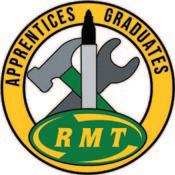THE RMT APPRENTICE CHARTER







Taking up an apprenticeship in the transport sector should be a coveted route into a skilled and secure job for life. The skills, knowledge and experience of generations of workers must be passed down to the next generation of workers who will keep our industries and economy moving.
However, we know that for many young people keen to enter the sector, this is simply not the case. Their experiences of training and education does not get close to matching their needs and expectations.
Since the privatisation of transport industries many apprenticeships have become fragmented, outsourced to the lowest bidder with on-the-job training and education being split between different providers often with unacceptably poor levels of quality and shocking facilities.
For instance, the maritime sector is often failing to train the next generation of UK Ratings, largely because of the rise of flags of convenience and the use of crewing agents recruit from overseas at poor levels of pay.
With a rapidly ageing workforce and tens of thousands of transport workers set to retire within the next decade, the government needs a fully funded strategy to invest in the future generations that will keep our country moving for decades to come.
This Apprentice Charter sets out the problems with apprenticeships across the transport sector and the solutions that we believe the government must implement quickly to avoid the impending cliff edge of a rapidly ageing workforce. It is not a question of not being able to afford it, our country and our economy cannot afford not to do it.
Eddie Dempsey RMT General Secretary
• Better pay and terms and conditions in private sector apprenticeships
• An end to fixed term contracts
• Insourcing of apprentice training and education
• More skilled apprenticeships in our industries
• A New Apprentice Training scheme under Great British Railways (GBR)
Before the privatisation of the rail industry, British Rail (BR) apprentices were employed on permanent contracts and trained in-house. Apprentices were not utilised as a unit of labour and had National Union of Railwaymen (NUR) representation. In dedicated training schools at each of the main railway works, apprentices trained in workshop and engineering grades like maintenance and train building or generalised trades like plumbing and electrical installation.
Apprentice training was the focus of much investment and training schools were understood to be a key part of the programme for modernising Britain's railways. But since privatisation, apprentice education and training on the railway has been neglected. As the industry begins to move beyond the destructive era of railway privatisation there is an opportunity to reverse this decline.
Apprenticeships should offer a robust solution to a crisis facing Britain’s railway. Over the next five years, the National Skills Academy for Rail (NSAR) estimate that over 50,000 rail industry employees will retire.
This, coupled with a seismic skills shortage means the NSAR estimate an additional 153,000 people are necessary to bridge the skills gap and ensure our industry’s resilience and growth. Analysis shows the bulk jobs must be at levels best served by apprenticeships.
However, the standard of apprenticeships currently on offer for prospective railway workers is poor. RMT members in the largest employers (public sector) find their apprenticeships to be lacking in quality, structure and security. In the private sector, apprenticeships are fragmented and lack standardisation or adequate pay. Substantial improvements to the quality of education and the terms and conditions of apprentices nationally are necessary to attract the next generation of railway workers we need.
Apprenticeships in the privatised rail industry are fragmented and patchy with privatisation impacting the standard and quality of education and terms and conditions in much of the privatised rail sector.
Most train operating companies (TOCs) outsource their technical fleet maintenance roles to these private railway engineering companies. Starting salaries here are noticeably lower than comparable roles in public sector Network Rail and London Underground. This is because the private sector generally has poorer collective bargaining agreements and a lack of union representation which leads to worse pay and terms and conditions for employees.
Although their engineering roles are generally outsourced, TOCs may also employ staff on ‘bogus’ customer service apprenticeships such as for on-board caterers and customer service positions on stations. These ‘apprenticeships’ allow employers to pay their staff worse salaries.
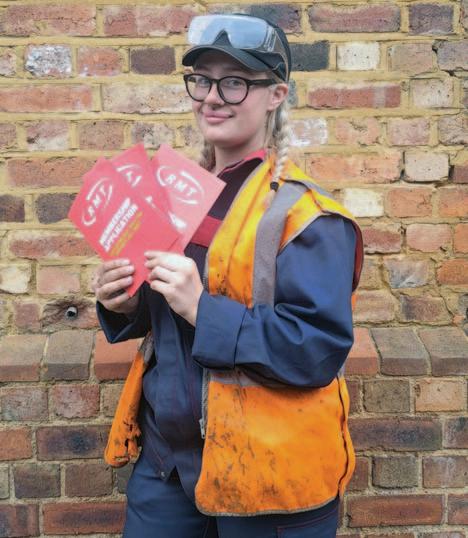
REP: RMT young member Taylor Beal is the very first female union representative at Gemini rail in Wolverton.
“I hope to inspire other women in the industry to step up and find the confidence to voice their opinion,” she said.

RECRUITED: Network Rail starters join up
Public sector apprenticeships in the rail industry include those under Network Rail who maintain and renew the UK’s railway track and infrastructure, and London Underground. The current picture is generally better in the public sector than the private sector but over recent years there has been a notable degradation in the quality of apprenticeships. RMT’s recent survey of apprentices highlights the continued and increasing issues faced by apprentices within these employers.
Network Rail has an active apprenticeship programme with various levels of apprenticeships on offer that vary in rates of pay and duration. NWR is the largest employer of railway apprentices, taking on roughly 200 apprentices annually.
Network Rail apprentice training used to be provided at a national training centre in Coventry. However, in the last few years, NWR has regionalised their programmes which are still provided in-house. For apprentices at NWR, communication and support are a consistent issue. Apprentices often feel ignored and struggle to get signed off.
“The apprenticeship moved the goal post on my completion many times, failed to give me all the courses I needed to complete and failed to give me a consistent point of contact by changing my apprenticeship manager 8 times over the course of my apprenticeship.”
“The organisation and communication is abysmal”
“Once you are ready it takes ages to get signed off all whilst being promised a job that never happens”
London Underground has an established apprenticeship programme with various levels of apprenticeships on offer that vary in rates of pay and duration.
Unlike Network Rail, London Underground has outsourced its education to a further education college called The College of Haringey, Enfield and Northeast London (CONEL). Apprentices at LU are on fixed-term contracts and many feel anxious about whether they will be able to complete their apprenticeship or secure a job post-apprenticeship with the current quality of teaching.
“CONEL college isn't fit for purpose, we don't get the training or preparation we need before getting into the workplace”
“Some of the college tutors are not even trying to teach in my opinion. They use AI to create presentations that make no sense and to mark our work. They do not provide any real lessons and or useful feedback”
“I feel nervous about my future on this fixed-term contract”
“I know personally that raising issues of sexual harassment on placement was made more difficult for myself due to the insecurity of the fixed term contract”
“The college facilities are poor, and it gives a feel that the contract to deliver the course was sold to the lowest bidder.”
“We are all eager to learn but it doesn’t feel like we are being given the tools to, we aren’t even being given instructions on how to.”
The maritime sector is generally poor for training the next generation of UK ratings, largely because of the rise of flags of convenience and increasing use of crewing agents that recruit internationally on poverty pay rates.
The Maritime Skills Commission produced a report last year into the barriers to training Ratings. It recommends allowing Support for Maritime Training (SMarT) funds (public) to be spent on apprenticeships. At present, SMarT is worth £20m per year and almost 100% of it goes on meeting 50% of employers’ costs in training Cadets/Officers.
There are positive examples of maritime apprenticeships. In Scotland, CalMac continue to provide an example to the rest of the industry and the Royal Fleet Auxiliary (RFA) continues to take on new merchant navy ratings. However, the pay and conditions of the RFA must improve tocontinue to attract prospective seafarers. The big private sector ferry companies, DFDS, P&O and Stena are all taking on trainee ratings, but we need to see a major increase over the next few years.
DFDS only took on 10 apprentices this year and these companies are struggling with a shortage of ratings, particularly in catering grades.
However, it appears that the bulk of the commercial shipping industry is failing to support the next generation of British seafarers simply to cut costs.
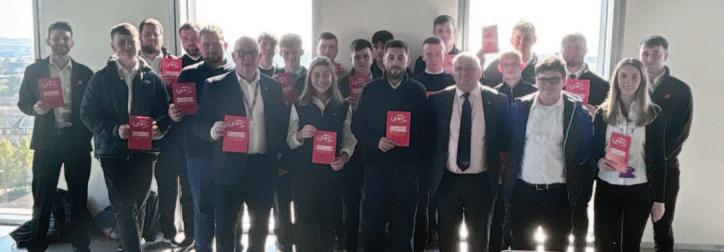
RECRUITING: RMT recently recruited 20 young people taking up 12 Deck and eight Engine Apprenticeships at Scottish ferry company Caledonian MacBrayne
The scandal of low pay for apprentices in the private sector must end. Apprentices need standardised pay above the national living wage and National Collective Bargaining for private engineering companies. We also want to see an end to bogus apprenticeships where young people are paid below the National Minimum Wage.
Many apprenticeships are offered on fixed-term contracts meaning there is zero guarantee that apprentices will be offered employment once the apprenticeship is finished. This has led to an increase in companies offering bogus apprenticeships where young workers are essentially used as a cheap unit of labour without full employment rights expected in other contractual work. We want a job guarantee for all apprentices if the qualification is passed and permanent contracts and workers’ rights from day one.
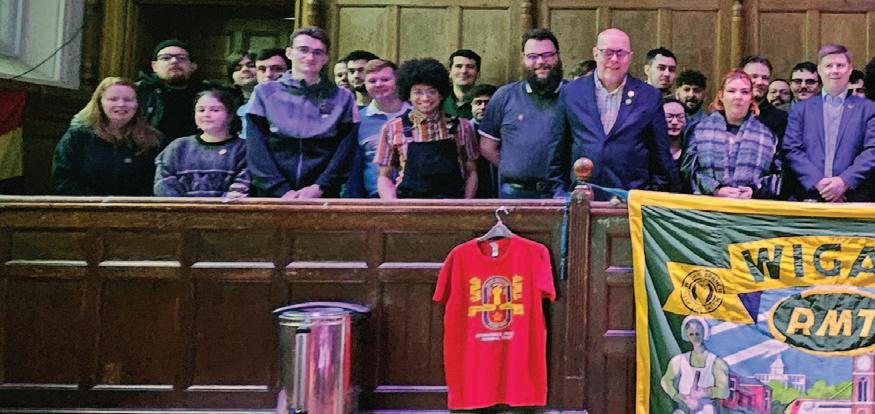
The fragmentation of rail privatisation has led to the outsourcing of apprentices training and education often to the lowest bidder with many education facilities and teaching being completely inadequate and substandard. We want a return to dedicated in-house facilities for apprentice training and quality education for apprentices to the highest standards
Currently, there are nowhere near enough new apprentices being taken on in the rail industry. The National Skills Academy for Rail highlights how upwards of 5,000 new railway apprentices are needed each year to avoid the ageing and retirement cliff edge in the rail industry. We want the Department for Transport to set an ambitious and fully funded apprenticeship strategy with growth targets for the industry with specific regard to skills gaps.
The government must use the opportunity of new legislation to establish Great British Railways and ensure that it includes a new centralised and fully funded apprentice training scheme which will provide exposure and a pathway for uniformed, overalled and backoffice apprenticeships going forward.

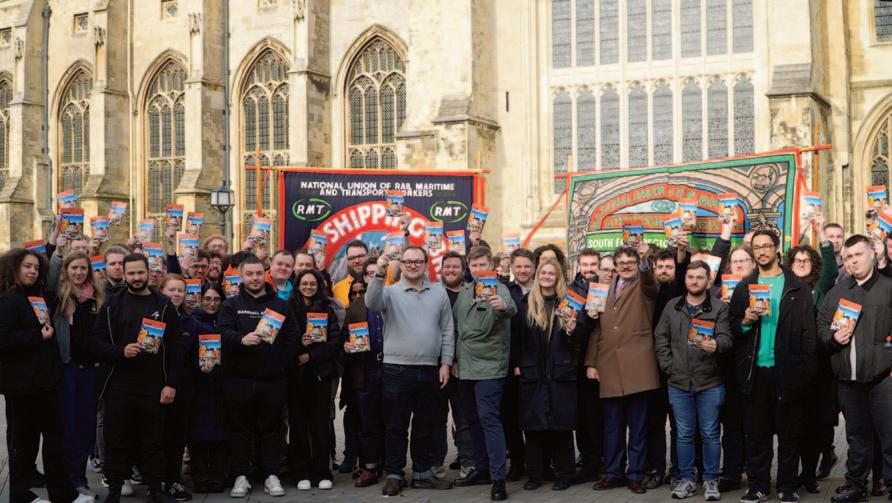
If you are an RMT member under 31, then get involved with the Young Members' Advisory Committee and the annual conference for young transport workers which takes place every February.
This charter was produced by the RMT Young Members' Apprentice Organising Committee with thanks to Sarah Cundy and Rhys Harmer and to Eddie Dempsey for his ongoing support from the top table.
Young Members' Committee chair Sarah Cundy said that this charter had been made possible by the ongoing work of the RMT Young Members' Apprentice Organising Committee which seeks to organise and build the voice of apprentices in the union.
For further information or if you want to get involved, contact YMChair@RMT.org.uk
